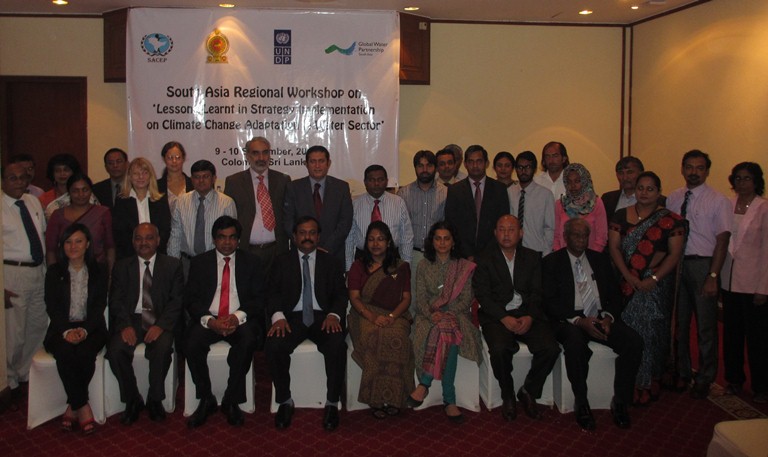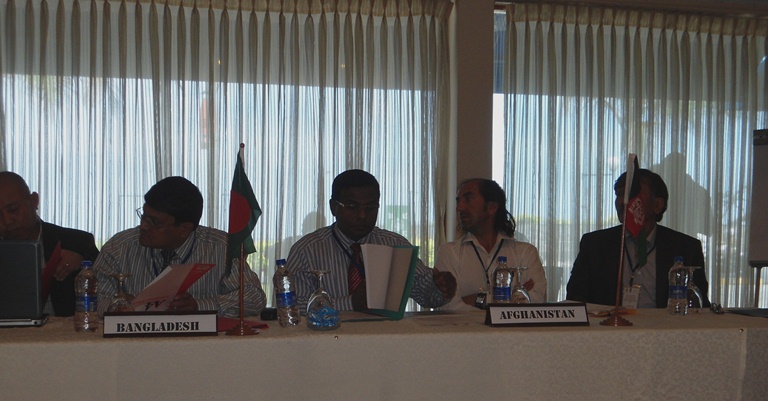
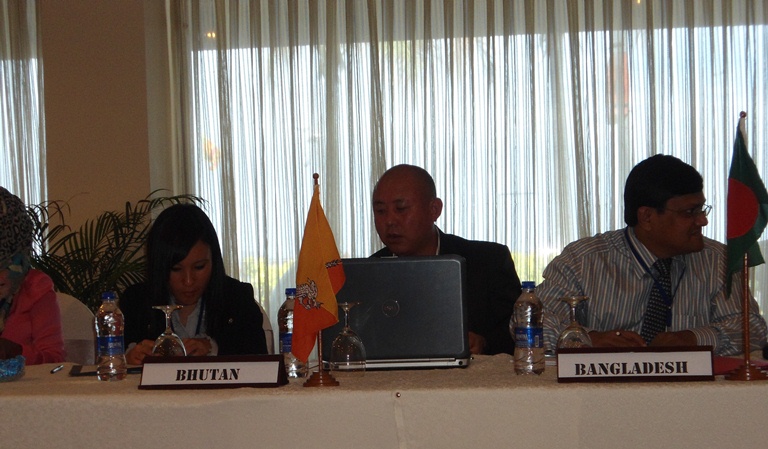
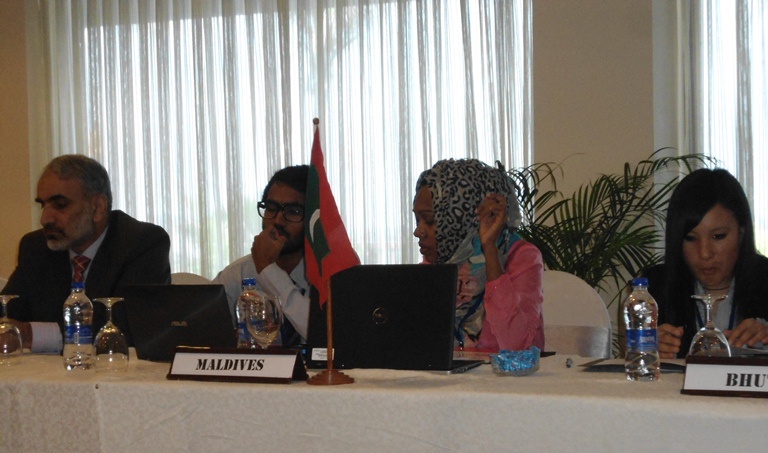
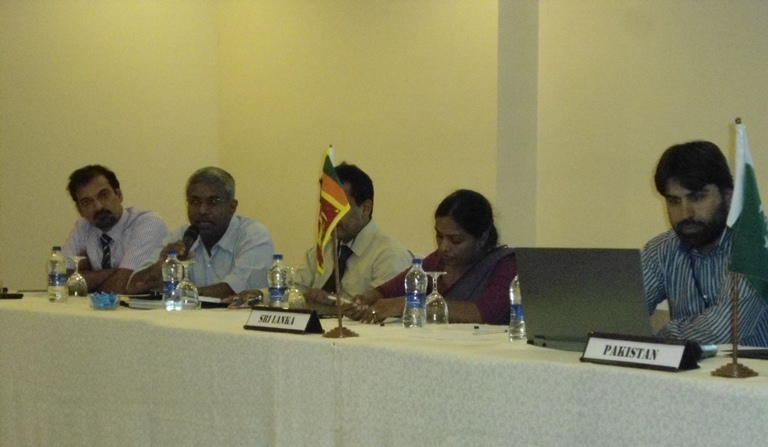
The South Asia Regional Workshop on lessons learnt in Strategy Implementation on Climate Change Adaptation (CCA) in Water Sector was held on 9 to 10 September 2014 in Colombo, Sri Lanka and it was organised by South Asia Co-operative Environment Programme (SACEP) in partnership with GWP South Asia.
This workshop gathered policy makers and practitioners of seven countries of South Asian region together and provideda platform to share and learn from each other on Strategy Implementation on Climate Change Adaptation in Water Sector. Approximately 30 participants representing Ministries of Environment, Water Resources and Climate Change, SACEP, GWPO, GWP SAS and Sri Lanka Water Partnership attended the workshop.
The objectives of the workshop were to: share experiences and assist governments in developing strategies for adaptation to climate change in the water sector; assess the information needs in the region to define such adaptation strategies; and especially to address the benefits of and mechanisms for trans-boundary cooperation in climate adaptation activities and to generate understanding of the NAPs process and how this could be potentially connected to developing strategies for adaptation to climate change in the water sector.
At the inauguration, Mr S.M.D.P. Anura Jayatilake; Director General SACEP said “integrating adaptation measures in sectoral and institutional level is important to safeguard existing and future development progress in the light of current climate variability. Mainstreaming of climate change adaptation into developmental planning is still in early stages in most of the countries in the South Asia Region. All of us need to give much attention and speed-up these processes”.
The massage of Honourable Minister Susil Premajayanth; The Ministry of Environment and Renewable Energy, Government of Sri Lanka emphasised that water is and should be at the centre of climate change adaptation. Water is essential for many sectors while climate change has important implications on these sectors especially through the hydrological changes. Therefore dealing with water is an important part of adaptation to climate change. He said “in this scenario, working together as a region is very essential and it will give you more strength and save time and money”.
After giving a brief introduction to GWP and GWP SAS Ms Priyanka Dissanayake, Regional Coordinator GWP SAS mentioned that "the countries in the region are diverse in terms of water resources but there are similarities in managing them and learning from each other is important. There are 54 transboundary rivers in the region and regional cooperation is essential while Maldives is unique. Drought and floods happen at the same time and more integrated approach to water management is required to address that."
The inauguration was followed by the two days technical sessions on, Policies and strategies steered by Ms Rohini Kohli; NAP-Global Support Programme Team, United Nations Development Programme (UNDP) Regional Office, Bangkok, Mr Batu Krishna Uprety; Expert Member, Climate Change Council and Chair of the UNFCCC Least Developed Countries Expert Group (LEG), and representative from GWP Nepal, and Susanne Skyllerstedt; Team Member of the Water, Climate and Development Programme, GWPO, Stockholm. The focus of the session was on the newly developed GWP Strategy “towards 2020” – towards a water secure world, the post 2015 development agenda, and the development of NAPAs and NAPs. After an introduction by Ms Skyllerstedt to the National Adaptation Plan (NAP) process at global level and GWP support to the process through the Global WACDEP and the NAP-GSP, Ms Kohli explained the difference between NAPA and NAP, going into more detail on some specifics in the NAP processes and UNDP’s efforts in supporting the process.
In the afternoon session of the first day, implementation experiences of CCA strategy and institutional mechanisms: lessons and recommendations were presented by country representatives from Bangladesh, Nepal, Afghanistan, Pakistan, Sri Lanka, Bhutan and Maldives. In the discussions, the importance of information dissemination, coordination, transboundary water management, protection of glaciers, enhancing the national capacity and aligning CCA with the national plan were some of the issues raised by the experts.
Day two started off with a group work session where country teams were given four questions on national adaptation planning and linking up to the NAP process in their respective countries. Examples covered current adaptation planning and practices related to water resources, including IWRM plans, policies and strategies, lessons learned, good practices, gaps and needs. Two questions linked up with the NAP process which can connect adaptation planning to national development plans and public investments. The results of the discussions were presented by the country representatives.
It was emphasized that CCA should to be led by the Government Authorities. There is need for building new strategies on existing mechanisms and for multi-stakeholder participation in the processes. A flexible implementation approach, training and capacity building were suggested for smooth implementation of CCA in countries. Further, rainwater harvesting, conservation of streams, construction of water collection tanks, identification of new water resources, conservation and management of existing water resources were proposed as adaptation actions.
The workshop ended with a session on tools and methodologies, chaired by Ms Angela Klauschen and included presentations from Mr Uprety on Climate Change Impacts in Water Sector: localized adaptation and integrate water focused adaptation into planning process with case of Nepal and Dr Herath Manthrithilake, Head, Sri Lanka Development Initiative, IWMI, on Strategies and activities: Linking river basin management adaptation activities to national and regional climate change adaptation.
For more details...
Presentations: Day one
